The Big Issue (TBI) is a street newspaper founded in 1991 that offers people who are homeless or individuals at risk of homelessness the opportunity to earn an income and reintegrate in society, under the principle of a hand up, not a hand out. After 30 years of being the most circulated newspaper in the world, The Big Issue has lost the power it had before in the UK. Younger generations don't seem to be aware of what TBI is or their mission, and engagement with the brand and media is endangered. Specifically talking about an upcoming generation that is taking the media world by storm -Gen Z-: How might we enable an interaction with them for TBI and create a value exchange between them?
The research started with open interviews carried out in spaces that were comfortable for this type of users: university pubs. Here we gathered information about their personal areas of interest, including: social impact/social media usage, values and interests. We combined this research tool with desk research, where we started seeing a media portrayal of GenZers as a group that is very linked to activism, future leaders of the change we want to see in the world. But, that was not very in tune with their disengagement with a brand like TBI and with the results of the interviews. We hypothesized that Gen Z was far more dynamic in terms of characterisation than many studies suggest.
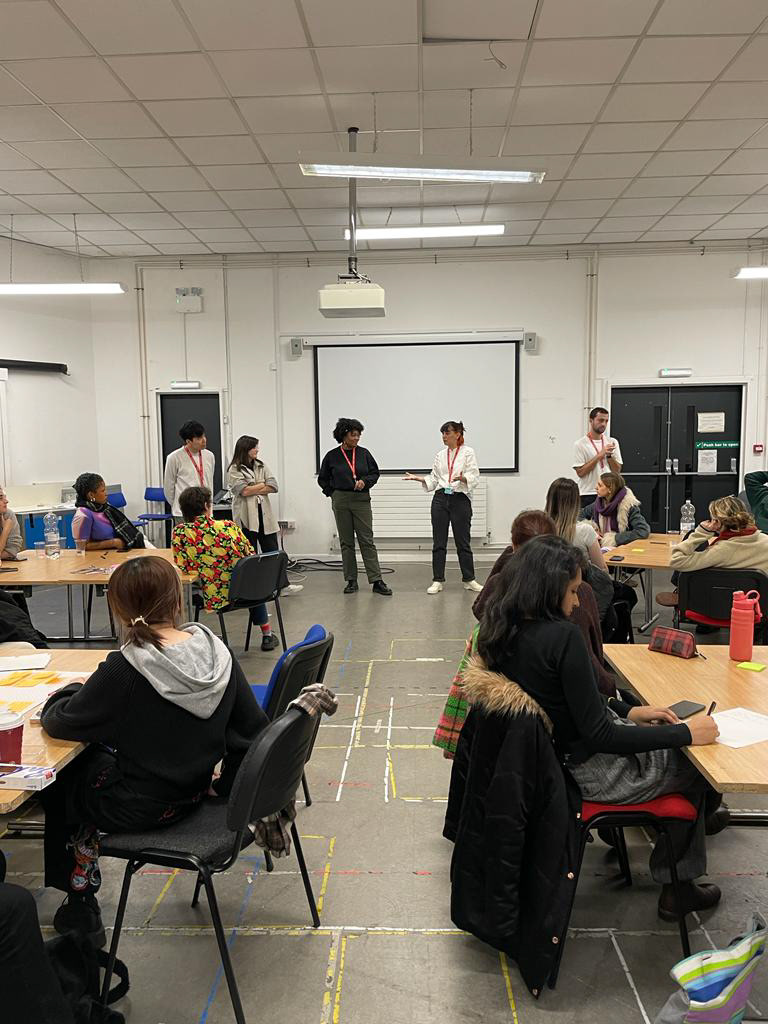
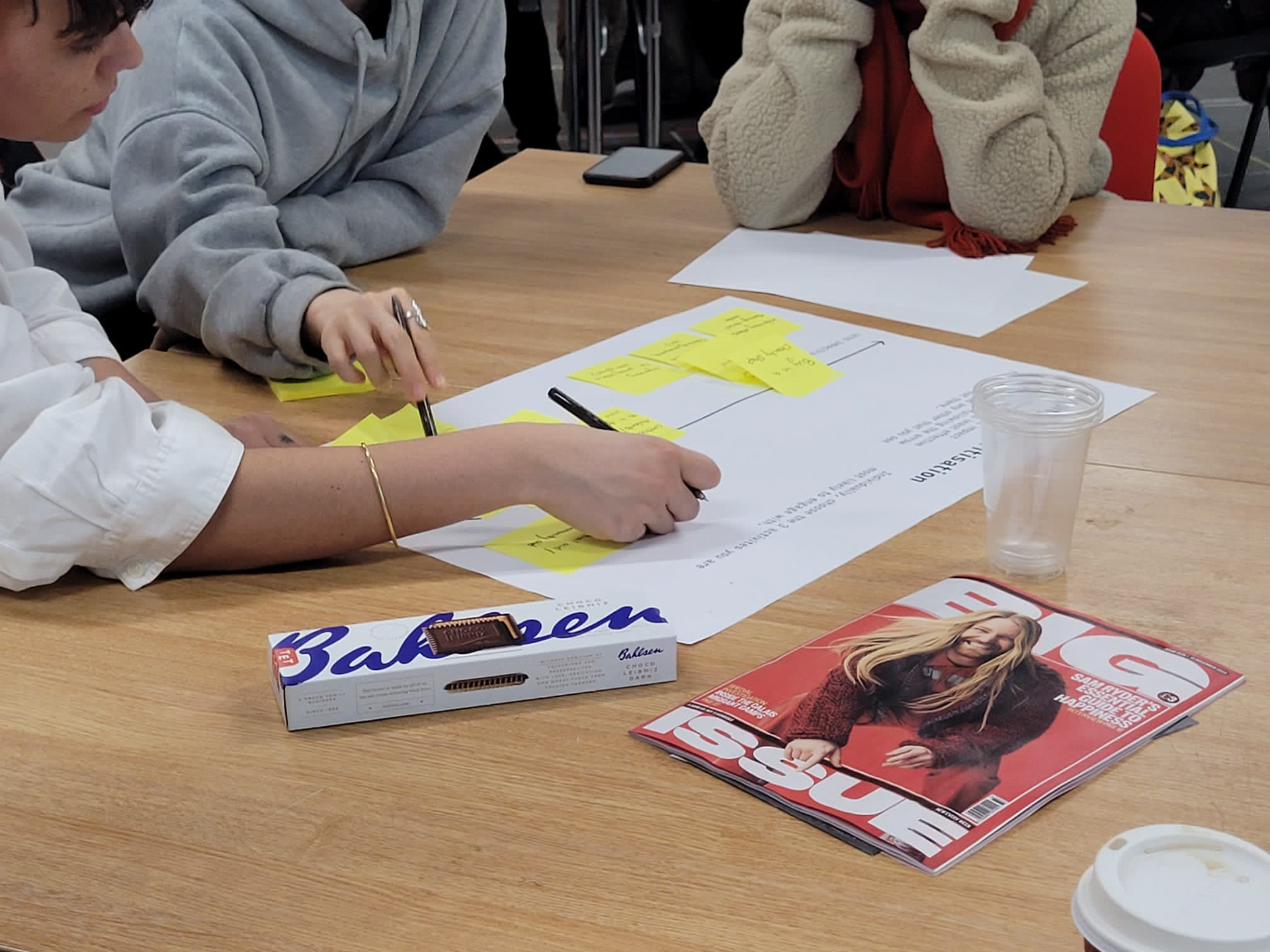
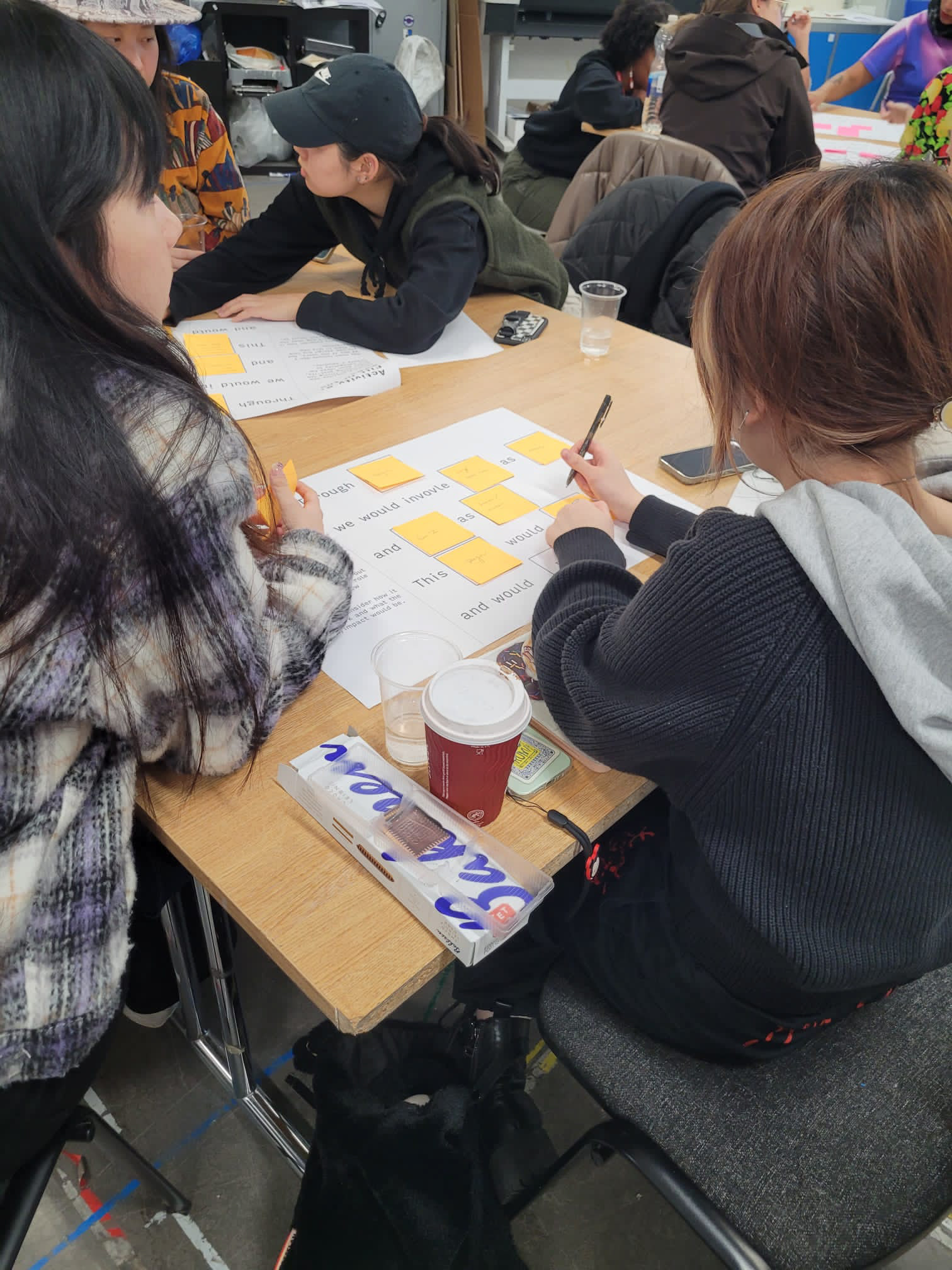
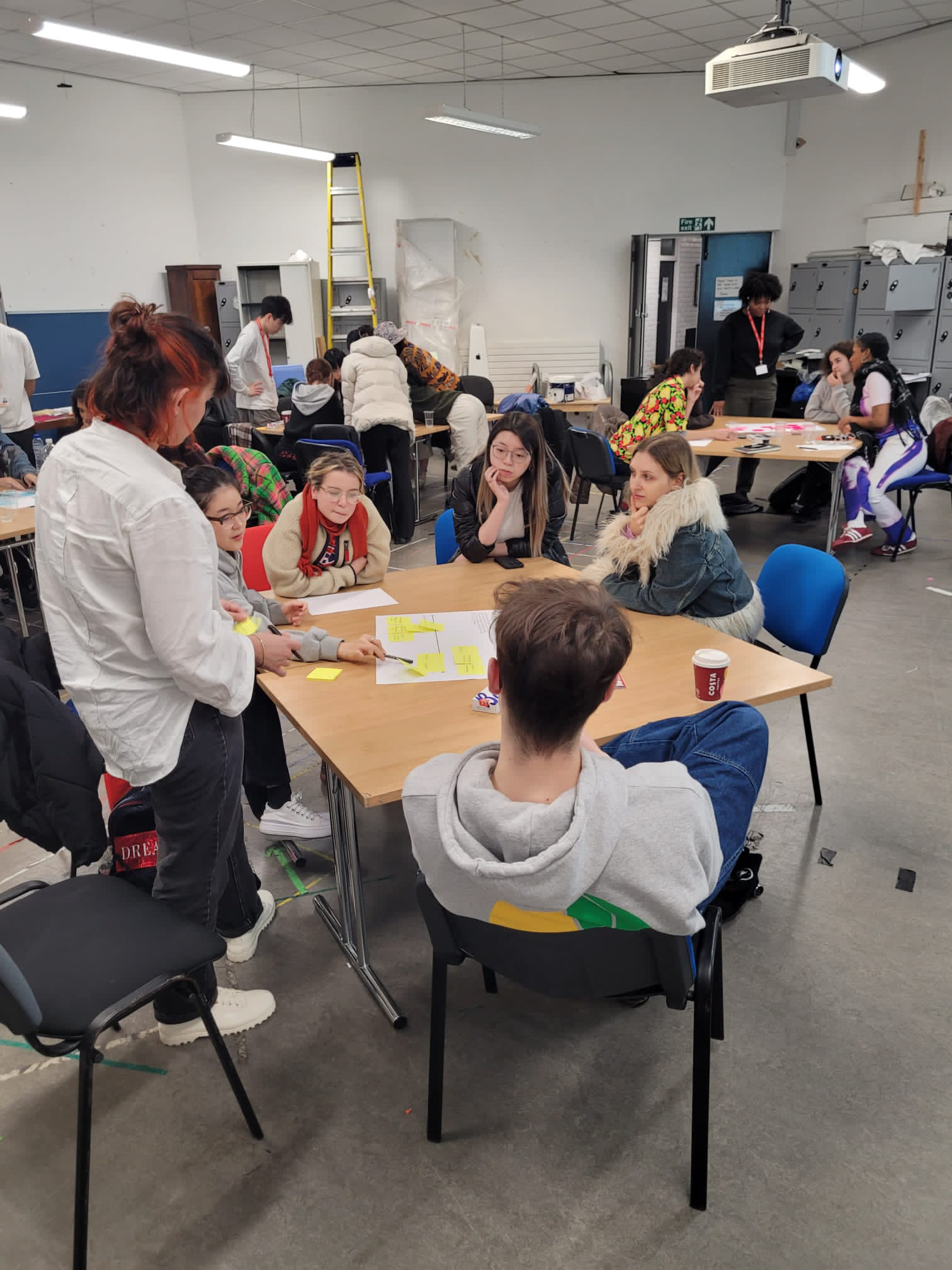
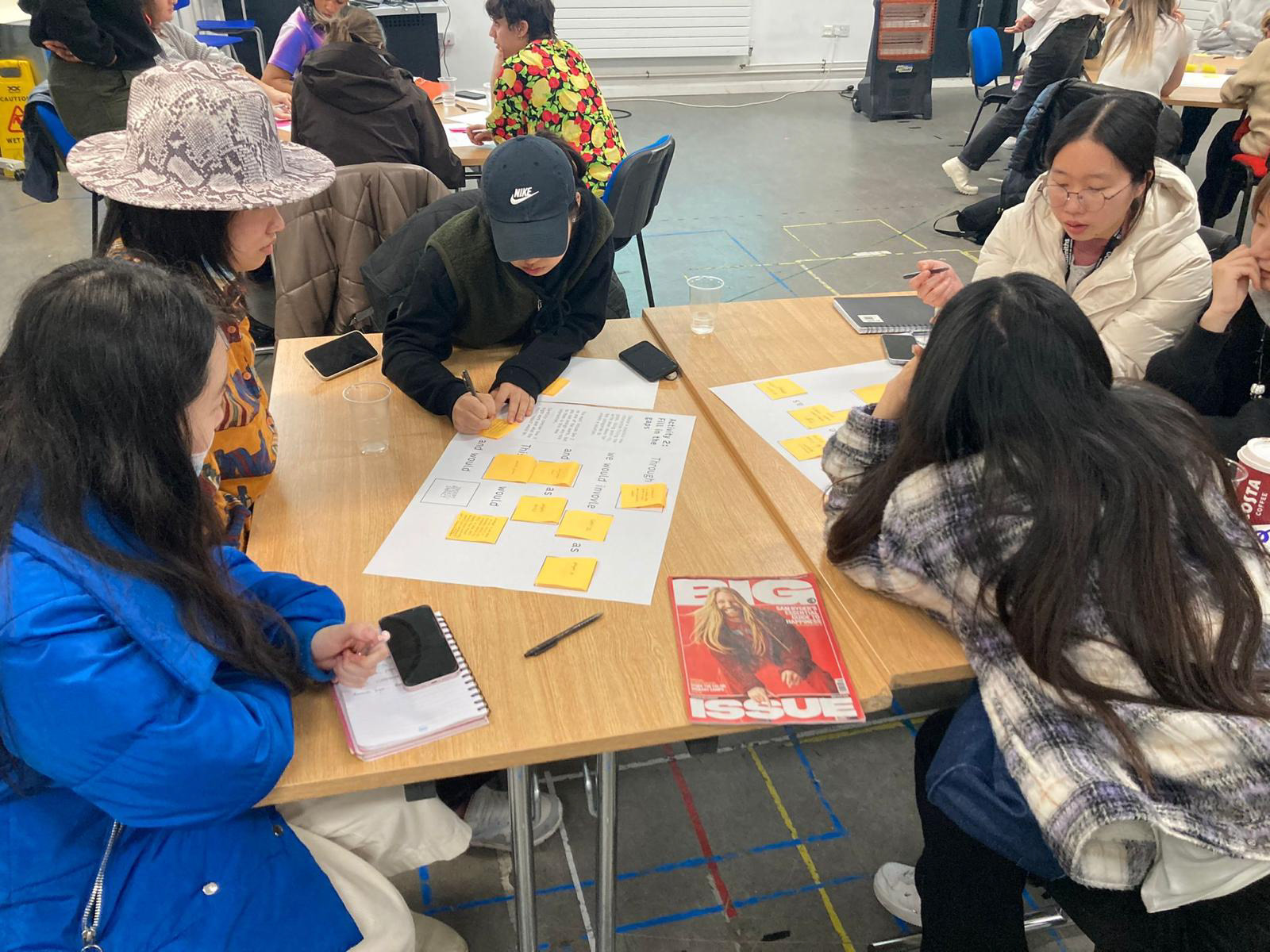
To prove this hypothesis we carried out a co-design workshop with 20 Design Students from Goldsmiths University (images above), where they would help us ideate what would be best for them in relation to social issues. But, the workshop was meant to act as a meta workshop: where the groups into which we divided the participants, and the activities we got them to do not only were going to be used for ideation of our project but also give us information about the characterization we were looking into. For this, the participants were pre-evaluated through the inscription form they answered, being able to create 4 groups of similar characteristics in order to evaluate their interaction with the activities.
After analyzing their interaction within the workshop, we were able to prove that the media portrayal of Gen Z and the reality of how they interact with social issues in general is not in sync. We created three model characterizations to guide the design of our intervention in relation to our findings:
Alphas: Group Alpha in the social impact world are identified as social activists. They have a good understanding of social issues and are involved in activism. It is clear to them that there is a difference between social issues and political issues. They pay attention to detail and are skeptical, they don't trust big organizations but they see value in large-scale movements to create an impact in the world.
Followers: The followers are worried about being judged. They have some knowledge of social issues but they're not very actively involved in social activism. It is clear to them that there is a difference between social and political issues. They want to be guided and reassured. They can be easily overwhelmed and lack some perspective due to them relying on others' examples. They value an exchange of services over an exchange of goods and they appreciate the value of community-scale projects. They value their anonymity when it comes to social activism.
IDC/IDK: The I Don't Care/I don't know (idc) sit within their own bubble. They lack knowledge and are unengaged with social and political issues. Need to be guided and reassured. They have a fear of being wrong. They can be more naive. They value an exchange of services over an exchange of goods and they appreciate the value of community-scale projects. They value their anonymity when it comes to social activism.
Moreover, as a general insight we discovered that Gen Zers have been developing their individuality a little differently than other generations have before. Commonly, people tend to build their identity through constant interaction with an open environment, which feeds information bi-directionally into their own worlds. In the case of Gen z, their worlds are far more enclosed, because their environments can be more restricted due to digital interaction as a replacement of this previous bidirectional exchange. As a result, Gen Zs tend to build their identities by interacting within their comfort zones. Organizing themselves in interest bubbles that often have no intersection, generating intolerant behavior and isolation among this generation. Added to that, they receive a massive influx of information every day due to digitalization, and many of them have trouble digesting and processing the non-stop stream of content. As a result, they are lost in a flood of information and seek the intervention of others in the search for guidance and direction in life, which makes follower behavior even more common.
Proposal
We identified that there is a huge opportunity of empowerment in the behavior of the followers through professional guidance and community development, allowing them to find their own voice through social action. The Little Big Issue, is a co-created zine from Gen zs to Gen zs. The zine acts as a catalyst to create a safe space for Gen Zers to find their voice.
Turning awareness into action.
How it works
Through an application process, The Big Issue Group selects a cohort of curators that become part of The Big Issue -following an internship model- and are in charge of creating the zine.
This curatorial cohort will define the editorial guidelines and theme of the next zine issue. As a group, they create an open call for other Gen Zers to become collaborators of the Zine and to share their works related to the proposed theme. Selecting the material, they work together to edit and print the zine in collaboration with the expertise of TBI and other collaborators invited to guide and inform the process.
Finally, TLBI works with vulnerable people to distribute and sell the zine using a pay as you can model and also opening digital channels for distribution.
Simplified blueprint of the internal service
TLBI Prototype
With help from Goldsmiths students who had participated in our first meta-workshop we created a small scale prototype of what this programme could look like in order to test our assumptions about collaboration, desirability, distribution and continuity. To do this we created an initial curation workshop, an open call and a printed version of a prototype zine that we later distributed in the streets.
6 students determined the core theme of the prototype issue would be “Quiet Quitting.” This is a term that has become increasingly relevant to the Gen-Z population, as many young people in this generation struggle with mental health issues related to stress, burnout, and depression. In the context of quiet quitting, it refers to a sense of disengagement, a lack of motivation, and a tendency to withdraw from responsibilities and challenges. Following the workshop we opened a call for submissions to the zine; within one week we received 7 works in response to this theme.







Testing the pay-as-you-can model we distributed the zine with success, selling all 40 of the copies in 2 hours at a variety of price points, the highest being 10 pounds. This prototype helped us prove that there is a space for collaboration and creation around social issues within young people, but that empowering them to express that in their own language is key for them to turn their awareness into action. There is also a big interest in buying this kind of material, especially when sold as a limited edition product reviving the vintage nature of media. Also, people value that it has been done in collaboration with people that are not necessarily professional or recognised in the area, creating empathy and a desire to participate in the future, creating a cyclical model that gives continuity and sustainability to the programme itself.
Group Work
Also part of this project: Takuro Nuruki, Tegan Mills, Morgan Thweatt and Tomás Oliveros